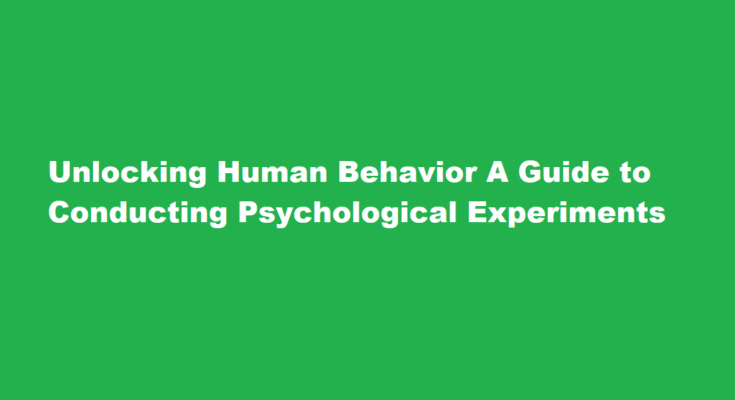Introduction
Understanding human behavior is a complex task, but psychological experiments offer valuable insights into the intricacies of the human mind. Conducting well-designed experiments can shed light on why we behave the way we do, providing researchers with valuable data for analysis. In this article, we will explore the essential steps to conduct a psychological experiment that delves deep into human behavior, uncovering the nuances and underlying factors that influence our actions.
Define the Research Question
The first step in conducting a psychological experiment is to define a clear research question. This question should be specific, measurable, and relevant to the phenomenon under investigation. Whether exploring cognitive processes, social behavior, or emotional responses, a well-defined research question sets the foundation for the experiment and guides the subsequent stages.
Literature Review
Before designing your experiment, conduct a comprehensive literature review to understand the existing research on the topic. Reviewing relevant studies will help identify gaps in the literature, reveal conflicting findings, and inform the development of hypotheses. Moreover, it allows researchers to build upon previous work and ensures that the experiment adds value to the existing body of knowledge.
Formulate Hypotheses
Based on the research question and the information gathered during the literature review, formulate clear and testable hypotheses. These are statements that predict the expected outcomes of the experiment. Hypotheses should be specific and precise, guiding the selection of variables and measurement tools.
Select Participants
Choosing the right participants is crucial for the success and validity of your experiment. Consider factors such as age, gender, cultural background, and any specific criteria relevant to your research question. Ideally, participants should be randomly selected to ensure unbiased results. Obtaining informed consent and ensuring the ethical treatment of participants is paramount throughout the experiment.
Design the Experiment
The experimental design depends on the research question and the hypotheses. Researchers can use various designs, such as within-subjects, between-subjects, or mixed designs. Control groups and random assignment can help minimize confounding variables. Additionally, decide on the manipulation of independent variables and the measurement of dependent variables accurately.
Data Collection
During the data collection phase, researchers should meticulously follow the experimental design. Use reliable and validated measurement instruments to gather quantitative or qualitative data. Ensure consistency in data collection procedures to enhance the experiment’s reliability and validity.
Data Analysis
Once data is collected, analyze it using appropriate statistical methods based on the research question and the nature of the data. Statistical analysis helps interpret the results and determine if the hypotheses are supported. This stage requires a good understanding of statistical techniques and software.
Interpretation and Conclusion
Interpreting the results involves understanding the implications of the findings and how they relate to the research question and existing knowledge. If the hypotheses are supported, draw conclusions that address the research question. If the results are inconclusive or contradictory, consider possible explanations and areas for further investigation.
Report and Publication
Document the entire experiment in a comprehensive report, including the research question, methodology, results, and conclusions. Share the findings with the scientific community through peer-reviewed journals or conferences. Dissemination of results contributes to the growth of knowledge and allows other researchers to build upon your work.
FREQUENTLY ASKED QUESTIONS
What is an experimental method in human behavior?
The experimental method involves the manipulation of variables to establish cause-and-effect relationships. The key features are controlled methods and the random allocation of participants into controlled and experimental groups.
How does psychology help understand human behavior?
Essentially, psychology helps people in large part because it can explain why people act the way they do. With this kind of professional insight, a psychologist can help people improve their decision making, stress management and behavior based on understanding past behavior to better predict future behavior.
Conclusion
Conducting psychological experiments is a powerful tool for unraveling the complexities of human behavior. By following these essential steps, researchers can design robust experiments that provide valuable insights into our actions, thoughts, and emotions. Through rigorous methodology, ethical considerations, and thoughtful analysis, psychological experiments play a vital role in expanding our understanding of human behavior, ultimately contributing to the improvement of human lives.
Read Also : A Guide to Growing and Caring for Diverse Fluttering Beauties



